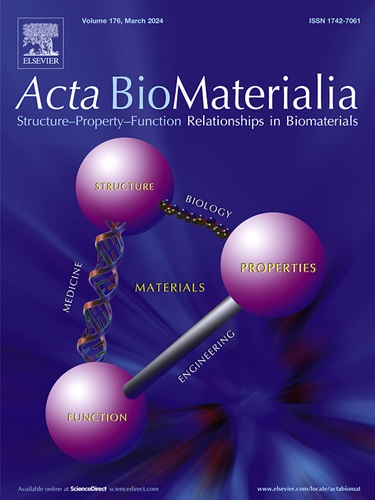Polyphenol-mediated assembly of toll-like receptor 7/8 agonist nanoparticles for effective tumor immunotherapy
IF 9.4
1区 医学
Q1 ENGINEERING, BIOMEDICAL
引用次数: 0
Abstract
Toll-like receptor (TLR) 7/8 agonists have shown significant potential in tumor immunotherapy. However, the limited pharmacokinetic properties and systemic toxicity resulting from off-target effects limits their biomedical applications. We here report the polyphenol-mediated assembly of resiquimod (R848, a TLR7/8 agonist) nanoparticles (RTP NPs) to achieve tumor-selective immunotherapy while avoiding systemic adverse effects. Upon intravenous administration, the prepared RTP NPs are effectively accumulated at tumor sites, which increase their bioavailability and reduce systemic inflammation. RTP NPs can trigger a potent antitumor immune response in a mouse tumor model to inhibit tumor growth. Additionally, after subcutaneous injection at the tail base, RTP NPs efficiently migrate to the lymph nodes, where they elicit immune memory to prevent tumorigenesis. This study underscores the potential application of polyphenol-mediated assembly in developing nanomedicines with reduced toxicity for tumor-specific immunotherapy.
Statement of significance
Toll-like receptor agonist (R848) nanoparticles for tumor-selective immunotherapy were synthesized through polyphenol-mediated assembly, a method that simplifies preparation process and minimizes potential side effects. Intravenously administered these nanoparticles effectively extended circulation time, enhanced tumor enrichment, and reduced systemic inflammation, thus augmenting the bioavailability and minimizing the side effects of R848. The nanoparticles significantly inhibited tumor growth by triggering a potent antitumor immune response, including dendritic cell maturation, macrophage polarization, T-cell infiltration, and cytokine secretion. Moreover, after subcutaneous injection at the tail base, they can elicit immune memory to prevent tumorigenesis.

多酚介导的toll样受体7/8激动剂纳米颗粒的有效肿瘤免疫治疗。
toll样受体(TLR) 7/8激动剂在肿瘤免疫治疗中显示出巨大的潜力。然而,有限的药代动力学性质和脱靶效应引起的全身毒性限制了它们在生物医学上的应用。我们在这里报道了多酚介导的雷昔莫特(R848,一种TLR7/8激动剂)纳米颗粒(RTP NPs)的组装,以实现肿瘤选择性免疫治疗,同时避免全身不良反应。经静脉给药后,制备的RTP NPs有效地积聚在肿瘤部位,从而增加其生物利用度并减少全身炎症。RTP NPs可以在小鼠肿瘤模型中引发有效的抗肿瘤免疫反应,从而抑制肿瘤生长。此外,在尾基皮下注射后,RTP NPs有效地迁移到淋巴结,在那里它们引发免疫记忆以防止肿瘤发生。这项研究强调了多酚介导的组装在开发具有低毒性的肿瘤特异性免疫治疗纳米药物中的潜在应用。意义声明:通过多酚介导组装合成用于肿瘤选择性免疫治疗的toll样受体激动剂(R848)纳米颗粒,该方法简化了制备过程并将潜在副作用降至最低。静脉注射这些纳米颗粒有效延长循环时间,增强肿瘤富集,减少全身炎症,从而提高了R848的生物利用度,最大限度地减少了副作用。纳米颗粒通过触发强大的抗肿瘤免疫反应,包括树突状细胞成熟、巨噬细胞极化、t细胞浸润和细胞因子分泌,显著抑制肿瘤生长。此外,在尾基皮下注射后,它们可以引发免疫记忆,防止肿瘤发生。
本文章由计算机程序翻译,如有差异,请以英文原文为准。
求助全文
约1分钟内获得全文
求助全文
来源期刊

Acta Biomaterialia
工程技术-材料科学:生物材料
CiteScore
16.80
自引率
3.10%
发文量
776
审稿时长
30 days
期刊介绍:
Acta Biomaterialia is a monthly peer-reviewed scientific journal published by Elsevier. The journal was established in January 2005. The editor-in-chief is W.R. Wagner (University of Pittsburgh). The journal covers research in biomaterials science, including the interrelationship of biomaterial structure and function from macroscale to nanoscale. Topical coverage includes biomedical and biocompatible materials.
 求助内容:
求助内容: 应助结果提醒方式:
应助结果提醒方式:


